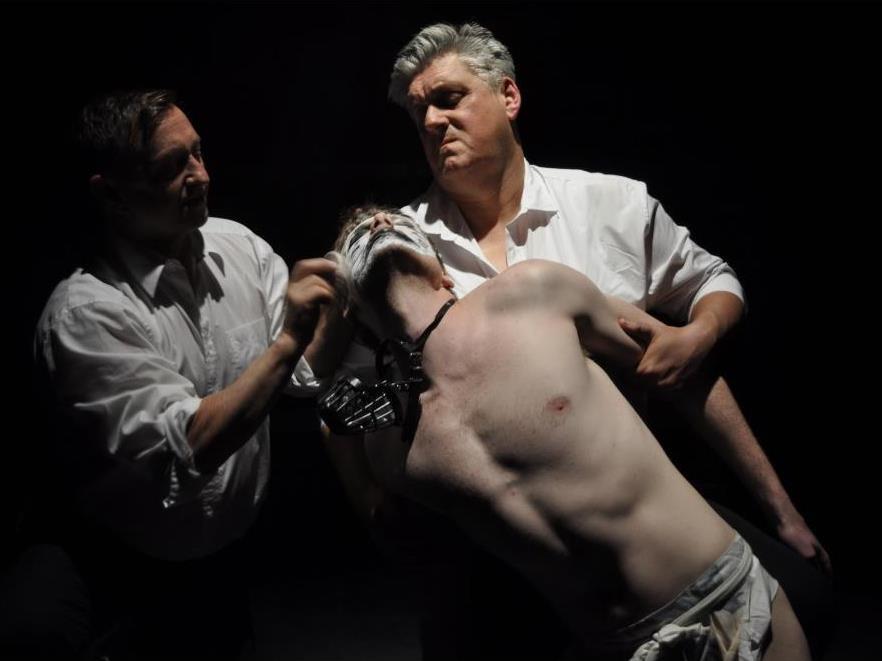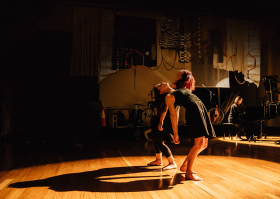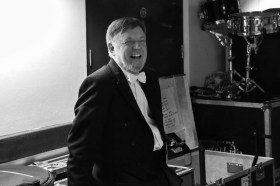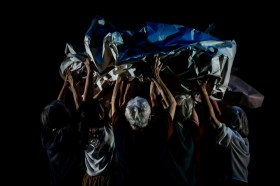Set in Melbourne, Broken River looks at the vicious cycle of abuse and scapegoating. Image: Jackie Mates.
Tony Reck’s Broken River, directed by Richard Murphet, is a play about bent coppers and hardened drug-dealing criminals in Melbourne. The body of trans sex worker Junie Patel (George Munro) is buried by Ace Corchoran (Edward McCullough) and Bubs Corchoran (Jackson Trickett), the hapless sons of brothel owner and drug dealer Marlene Corchoran (Carole Patullo). At first, it appears that Marlene is responsible for the murder, but, as the play progresses, it emerges that she’s been framed by the police, who are involved in a complex conspiracy.
This is a play about power, corruption and criminality – on both sides of the law. This is the first time this play has been produced. Patullo delivers a sterling performance as Marlene, brilliantly conveying both cruelty and vulnerability. Patullo’s naturalistic style enhances her persuasive depiction of hardened criminality. Trickett, as Bubs, convincingly conveys both naiveté and courage; his emotionally raw performance is commendable.
McCullough and Munro capture the fear and trepidation of flawed characters who find themselves at the mercy of the powerful and vindictive. Adrian Mulraney and Adam Cass play bumbling cops well; the idiocy of their characters belies their sinister purpose and lack of compunction.
This play challenges your notions about guilt and innocence, right and wrong, justice and injustice, and good and evil. However, the play’s narrative framework is anything but Manichaean. All the characters in the play are flawed. Everyone is guilty of some type of wrongdoing. What is interesting about the play is that it disturbs and destabilises conventional notions about right and wrong, and how you think about different types of wrongdoing. The characters we revile and find repugnant at the start are not the characters we find most abhorrent at the end. The audience’s moral compass shifts in the course of the play. Our sympathies reversed, we find ourselves questioning our moral certainties and, particularly, our assumptions about how the wheels of justice turn.
This is a play about justice and morality and it ought to be watched widely. The play offers an indictment not necessarily of public institutions in any particular setting, but, more broadly, of the intractable and pervasive corruption that emerges wherever absolute power rules unfettered. In such settings, justice is routinely perverted, and the machinations of the law are used and wielded with deliberate cruelty to entrap or extirpate those who are deemed dispensable. When the victims of a miscarriage of justice are hardened criminals, the moral compulsion to defend them is diminished, and the system can claim its scapegoats unhindered. Those who are falsely charged and maligned fall through the cracks.
More than the spectre of institutional corruption and festering criminality within law enforcement, it is our presumed complicity in the fate of the damned that arouses the greatest sadness and disgust. Tony Reck’s play does well to manipulate the audience’s sympathies. When we find them repugnant, do we become more willing to countenance the fate of the damned? I think Reck wishes us to say no.
4 stars out of 5 ★★★★
Broken River
By Tony Reck
Director: Richard Murphet
Set designers: Jessie Keyes, Juliette Whitney
Lighting designer: Kris Chainey
Sound designer: Raya Slavin
Stage managers: Jackie Mates, Diane Pereira
Cast: Adrian Mulraney, Carole Patullo, Adam Cass, Edward McCullough, George Munro, Jackson Trickett, Nick Stribakos, Allen Laverty
12-22 September 2019
La Mama Courthouse, Carlton
Tickets $20-30
Presented as part of Melbourne Fringe Festival, 12-29 September 2019





